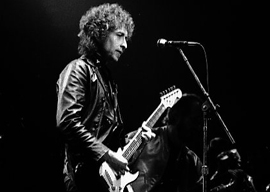
October 22, 2016

Bob Dylan
Source: Jean Luc Ourlin
The great sinologist and literary essayist Simon Leys began his essay on the French writer André Malraux by telling the story of a village priest who reduced his whole congregation to tears by the ardor of his preaching”all, that is, except one man, a visitor. He did not cry, and after the sermon was over the villagers asked him why not.
“I am not of this parish,” he replied.
With regard to the widespread admiration for Malraux, Leys wrote that he was not of that parish. I could write the same of Bob Dylan, who recently won the Nobel Prize in Literature. I am decidedly not of his admirers” parish. When I heard the announcement, I thought it was a spoof. I thought, “Why not award the Nobel Prize in Chemistry to a celebrity chef?” Poetry is made of words; Dylan wrote words. Food is made of chemicals; chefs mix chemicals. The analogy is not perhaps exact, but good enough.
It is true that I have not followed Dylan very closely. He never interested me much. To me, his nasal whine was authentically the sound of spoiled middle-class-adolescent self-pity. In fact, I thought it was so awful that he made the lugubrious Leonard Cohen sound like a nightingale. But I accept that tastes differ (though it must be remembered that humanity is more divided by taste than by anything else).
As to the supposed poetry, it seems to me not merely bad, but”except for an occasional line or two”authentically awful. It isn”t even funny like the verse of William McGonagall, a previous claimant to the honor of the worst poet of the English language. His most famous poem, “The Tay Bridge Disaster,” begins:
Beautiful Railway Bridge of the Silv”ry Tay!
Alas! I am very sorry to say
That ninety lives have been taken away
On the last Sabbath day of 1879,
Which will be remember”d for a very long time.
These are not necessarily the worst of McGonagall’s lines: As another poet, Gerard Manley Hopkins, put it (in a more existential context), “No worst, there is none.”
In fact, I can no longer laugh at McGonagall as I once did, for he strikes me as an authentically tragic (and heroic) figure. The son of illiterate Irish immigrants to Scotland, he knew the worst of Industrial Revolution-type poverty but nevertheless conceived the ambition to be both a Shakespearean actor (when he played Macbeth, it is reported, he refused to lie down and die) and poet. He believed that he was possessed of immense poetic genius and read his doggerel poems to the mocking applause of audiences everywhere, though he never realized that the applause was mocking. He died as he had lived, in poverty. His aim was noble, a desire to transcend his humble and hideous beginnings by means of art; he both failed catastrophically and succeeded triumphantly, for his name is as immortal (or as transient) as the English language itself. McGonagall, in fact, encapsulates in his single self the glory and absurdity of human existence.
He was a far greater man, then, than Bob Dylan, who hoped to become poetic by a kind of magical thinking, that is to say by literary association, taking upon himself the name of a true poet (Dylan Thomas), whose brilliance with language was evident from a very early age but who for a long time was as famous for his bohemianism as for his poems.
Not having studied Bob Dylan’s poetry very closely, it was helpful to me that, on the day after the announcement of the award, the Guardian newspaper published what it selected as his ten greatest lyrics. Here is one of them, that seems to me in the cold light of print to be distinctly sub-Shakespearean:
Idiot wind, blowing every time you move your teeth
You”re an idiot, babe
It’s a wonder that you still know how to breathe…
No doubt it is unfair to compare any living writer with Shakespeare, a genius who comes but once a millennium, if that. But it seems to me also that the lines above”supposedly among the best, be it remembered”are sub”Ella Wheeler Wilcox or Hallmark Cards, let alone sub-Keats or sub-Tennyson. Here, for example, is a verse from Wilcox, taken at random:
I do not like the phrase “It might have been!”
It lacks force, and life’s best truths perverts:
For I believe we have, and reach, and win,
Whatever our deserts.
Terrible, of course, but not as bad as Bob Dylan.